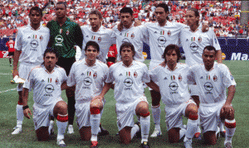By Robbie Butler
For the non-football fan, the ‘away goals’ rule is probably the most difficult to understand after the offside rule. First introduced in 1965, the rule was instigated in order to determine a winner more readily in European competitions. The rule also has another idiosyncrasy. The away goals rule encourages the visiting team to be more attacking and can result in more open and exciting football matches. Economics teaches us that people respond to incentives. Footballers are no different.
Critics of the rule often argue it gives an advantage to the team playing at home in the second leg. Should extra time be required, the home team get to play an extra 30 minutes in front of their spectators. The counter argument is that the visiting team has an extra 30 minutes to score an ‘away’ goal.
For those unfamiliar with the rule it works as follows. Should a two-legged tie end in a draw once both the score from the first leg and the score from the second leg have been added together, goals scored away from home will count as double.
A recent example can be found from examining Chelsea’s win over Paris St Germain (PSG) in the Champions League quarter final. The score line from the first leg in Paris was 3 – 1 to PSG. Chelsea won the second leg in London 2 – 0. An aggregate score of 3 – 3. Chelsea however advanced to the semi-finals as they had scored one away goal (now counting double).

The Champions League semi-final in 2003 provides an even better tale.
AC Milan are probably the only team ever to score at their home ground (San Siro) and have the goal counted as an ‘away’ goal by UEFA. How you ask? The Rossoneri were playing against arch rivals Inter Milan, with whom they share the San Siro. Both legs were played at the same ground. AC were officially the ‘home’ team in the first leg which ended 0 – 0. Inter were the ‘home’ team in the second leg. The second leg ended 1 – 1 meaning an aggregate score of 1 – 1. AC Milan advanced having scored one ‘away’ goal to Inter Milan’s none.
I bet the designers of the rule in 1965 never thought of that one.
 RSS Feed
RSS Feed